Background
Kohn was born on October 15, 1957, in Miami Beach, Florida, United States; the son of Stewart L. and Estelle E. (Kauffman) Kohn.








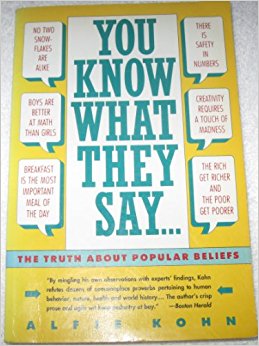
(Putting our frequently incorrect conventional wisdom to t...)
Putting our frequently incorrect conventional wisdom to the test through research, this book demonstrates the validity of popular beliefs, truisms, folk wisdom, and proverbs.
http://www.amazon.com/gp/product/0060921153/?tag=2022091-20
1991
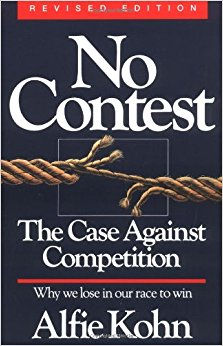
(No Contest stands as the definitive critique of competiti...)
No Contest stands as the definitive critique of competition. Contrary to accepted wisdom, competition is not basic to human nature; it poisons our relationships and holds us back from doing our best. In this new edition, Alfie Kohn argues that the race to win turns all of us into losers.
http://www.amazon.com/gp/product/0395631254/?tag=2022091-20
1992
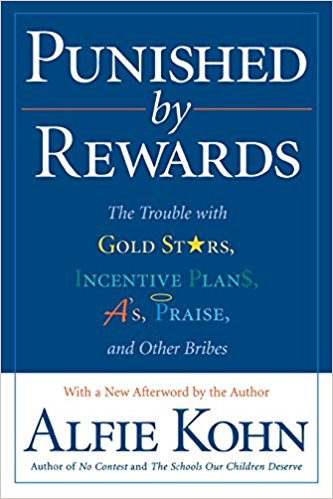
(The basic strategy we use for raising children, teaching ...)
The basic strategy we use for raising children, teaching students, and managing workers can be summarized in six words: Do this and you'll get that. We dangle goodies (from candy bars to sales commissions) in front of people in much the same way we train the family pet. Drawing on a wealth of psychological research, Alfie Kohn points the way to a more successful strategy based on working with people instead of doing things to them. "Do rewards motivate people?" asks Kohn. "Yes. They motivate people to get rewards." Seasoned with humor and familiar examples, Punished By Rewards presents an argument unsettling to hear but impossible to dismiss.
http://www.amazon.com/gp/product/0618001816/?tag=2022091-20
1999

("Alfie Kohn has a knack for bursting the bubbles that sur...)
"Alfie Kohn has a knack for bursting the bubbles that surround just about every school topic imaginable, from putting kids into uniforms to make them behave better to raising kids′ self–esteem by rewarding them with stickers and pizza for reading books and doing homework. This collection of previously published essays reminds us that many schools have veered off course in their day-to–day business. And it′s a primer that, if taken seriously, can put schools back on the right track." ––Educational LeadershipThrough his writings and speeches, Alfie Kohn has been stirring up controversy for years, demonstrating how the conventional wisdom about education often isn′t supported by the available research, and illuminating gaps between our long–term goals for students and what actually goes on in schools. Now What to Look for in a Classroom brings together his most popular articles from Educational Leadership, Phi Delta Kappan, and Education Week––and also from The Atlantic Monthly, the Boston Globe, and other publications. From self–esteem to school uniforms, from grade inflation to character education, Kohn raises a series of provocative questions about the status quo in this collection of incisive essays. He challenges us to reconsider some of our most basic assumptions about children and education. Can good values really be instilled in students? What, if anything, lies behind the label of attention deficit disorder? Are there solid data to support our skepticism about watching TV? Might such allegedly enlightened practices as authentic assessment, logical consequences, and Total Quality education turn out to be detrimental? Whether he is explaining why cooperative learning can be so threatening or why detracking is so fiercely opposed, Kohn offers a fresh, informed, and frequently disconcerting perspective on the major issues in education. In the And, his critical examination of current practice is complemented by a vision of what schooling ought to be. Kohn argues for giving children more opportunity to participate in their own schooling, for transforming classrooms into caring communities, and for providing the kind of education that taps and nourishes children′s curiosity. Through all these essays, Kohn calls us back to our own ideals, showing us how we can be more effective at helping students to become good learners and good people.
http://www.amazon.com/gp/product/0787952834/?tag=2022091-20
2000
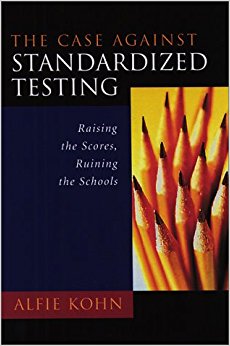
(Kohn's central message is that standardized tests are "no...)
Kohn's central message is that standardized tests are "not a force of nature but a force of politicsand political decisions can be questioned, challenged, and ultimately reversed".
http://www.amazon.com/gp/product/0325003254/?tag=2022091-20
2000
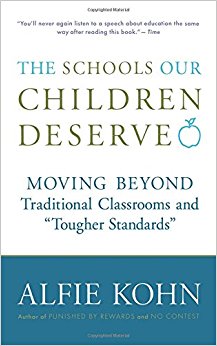
(Arguing against the "tougher standards" rhetoric that mar...)
Arguing against the "tougher standards" rhetoric that marks the current education debate, the author of No Contest and Punished by Rewards writes that such tactics squeeze the pleasure out of learning.
http://www.amazon.com/gp/product/0618083456/?tag=2022091-20
2001
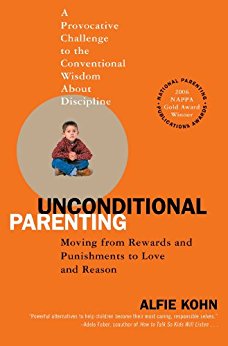
(Most parenting guides begin with the question "How can we...)
Most parenting guides begin with the question "How can we get kids to do what they're told?"-and then proceed to offer various techniques for controlling them. In this truly groundbreaking book, nationally respected educator Alfie Kohn begins instead by asking "What do kids need-and how can we meet those needs?" What follows from that question are ideas for working with children rather than doing things to them. One basic need all children have, Kohn argues, is to be loved unconditionally, to know that they will be accepted even if they screw up or fall short. Yet conventional approaches to parenting such as punishments (including "time-outs"), rewards (including positive reinforcement), and other forms of control teach children that they are loved only when they please us or impress us. Kohn cites a body of powerful, and largely unknown, research detailing the damage caused by leading children to believe they must earn our approval. That's precisely the message children derive from common discipline techniques, even though it's not the message most parents intend to send. More than just another book about discipline, though, Unconditional Parenting addresses the ways parents think about, feel about, and act with their children. It invites them to question their most basic assumptions about raising kids while offering a wealth of practical strategies for shifting from "doing to" to "working with" parenting-including how to replace praise with the unconditional support that children need to grow into healthy, caring, responsible people. This is an eye-opening, paradigm-shattering book that will reconnect readers to their own best instincts and inspire them to become better parents.
http://www.amazon.com/gp/product/B000GCFD72/?tag=2022091-20
2005

(In this 10th anniversary edition of an ASCD best seller, ...)
In this 10th anniversary edition of an ASCD best seller, author Alfie Kohn reflects on his revolutionary ideas in the context of today's emphasis on school accountability and high-stakes testing. Find out how his innovative approach- where teachers learn to work with students, rather than do things to them-has withstood the test of time and helped educators create positive learning environments that prevent discipline problems from occurring. Using examples of real teachers dealing with common behavior problems, Kohn explains Why classroom management approaches that rely on rewards and punishments actually prolong behavior problems. How to turn misbehavior into teaching opportunities. Why changing your curriculum can solve discipline problems.
http://www.amazon.com/gp/product/1416604723/?tag=2022091-20
2006
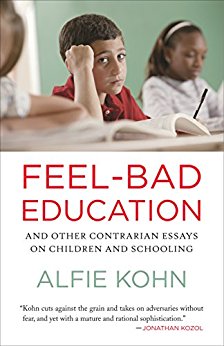
(Mind-opening writing on what kids need from school, from ...)
Mind-opening writing on what kids need from school, from one of education’s most outspoken voices . Almost no writer on schools asks us to question our fundamental assumptions about education and motivation as boldly as Alfie Kohn. The Washington Post says that “teachers and parents who encounter Kohn and his thoughts come away transfixed, ready to change their schools.” And Time magazine has called him “perhaps the country’s most outspoken critic of education’s fixation on grades [and] test scores". Here is challenging and entertaining writing on where we should go in American education, in Alfie Kohn’s unmistakable voice. He argues in the title essay with those who think that high standards mean joylessness in the classroom. He reflects thoughtfully on the question “Why Self-Discipline Is Overrated". And in an essay for the New York Times, which generated enormous response, he warns against the dangers of both punishing and praising children for what they do instead of parenting “unconditionally". Whether he’s talking about school policy or the psychology of motivation, Kohn gives us wonderfully provocative—and utterly serious—food for thought. This new book will be greeted with enthusiasm by his many readers, and by teachers and parents seeking a refreshing perspective on today’s debates about kids and schools.
http://www.amazon.com/gp/product/B004EWFUY6/?tag=2022091-20
2011
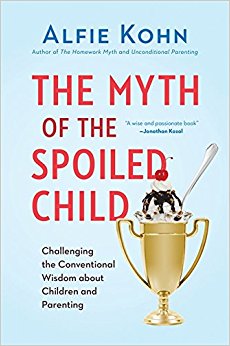
(Somehow, a set of deeply conservative assumptions about c...)
Somehow, a set of deeply conservative assumptions about children-what they're like and how they should be raised-have congealed into the conventional wisdom in our society. Parents are accused of being both permissive and overprotective, unwilling to set limits and afraid to let their kids fail. Young people, meanwhile, are routinely described as entitled and narcissistic among other unflattering adjectives. In The Myth of the Spoiled Child, Alfie Kohn systematically debunks these beliefs-not only challenging erroneous factual claims but also exposing the troubling ideology that underlies them. Complaints about pushover parents and coddled kids are hardly new, he shows, and there is no evidence that either phenomenon is especially widespread today-let alone more common than in previous generations. Moreover, new research reveals that helicopter parenting is quite rare and, surprisingly, may do more good than harm when it does occur. The major threat to healthy child development, John argues, is posed by parenting that is too controlling rather than too indulgent. With the same lively, contrarian style that marked his influential books about rewards, competition, and education, Kohn relies on a vast collection of social science data, as well as on logic and humor, to challenge assertions that appear with numbing regularity in the popular press. These include claims that young people suffer from inflated self-esteem; that they receive trophies, praise, and As too easily; and that they would benefit from more self-discipline and "grit". These conservative beliefs are often accepted without question, even by people who are politically liberal. Kohn's invitation to reexamine our assumptions is particularly timely, then; his book has the potential to change our culture's conversation about kids and the people who raise them.
http://www.amazon.com/gp/product/0738217247/?tag=2022091-20
2014
Kohn was born on October 15, 1957, in Miami Beach, Florida, United States; the son of Stewart L. and Estelle E. (Kauffman) Kohn.
Kohn received a Bachelor of Arts degree from Brown University in 1979. A year later he earned a Master of Arts degree from the University of Chicago.
Kohn taught at both the highschool and college levels. Also he was a visiting lecturer at Phillips Academy in Andover, Massachusetts in 1978-1985 and Tufts University in Medford, Massachusetts from 1983 to 1984.
Now Alfie spends his time writing and lecturing at various education and management conferences as well as at parent groups and organizations. In addition to this, he conducts workshops for teachers and administrators on various topics. Among them: "Motivation from the Inside Out: Rethinking Rewards, Assessment, and Learning" and "Beyond Bribes and Threats: Realistic Alternatives to Controlling Students’ Behavior".
Kohn’s various books have been translated into Chinese, Japanese, Korean, Spanish, German, Italian, Russian, Swedish, Dutch, Polish, Romanian, Hungarian, Bulgarian, Portuguese, Arabic, Hebrew, Thai, Turkish, Vietnamese, and Malaysian.
Alfie's many articles on education include a dozen widely reprinted essays in Phi Delta Kappan from 1991 to 2008. Among them: "Choices for Children: Why and How to Let Students Decide", "How Not to Teach Values: A Critical Look at Character Education", "Test Today, Privatize Tomorrow" and "Why Self-Discipline is Overrated".
("Alfie Kohn has a knack for bursting the bubbles that sur...)
2000(Arguing against the "tougher standards" rhetoric that mar...)
2001(In this 10th anniversary edition of an ASCD best seller, ...)
2006(Kohn's central message is that standardized tests are "no...)
2000(Putting our frequently incorrect conventional wisdom to t...)
1991(Somehow, a set of deeply conservative assumptions about c...)
2014(Most parenting guides begin with the question "How can we...)
2005(The basic strategy we use for raising children, teaching ...)
1999(Mind-opening writing on what kids need from school, from ...)
2011(No Contest stands as the definitive critique of competiti...)
1992
Quotations:
"Don't let anyone tell you that standardized tests are not accurate measures. The truth of the matter is they offer a remarkably precise method for gauging the size of the houses near the school where the test was administered".
"Educational success should be measured by how strong your desire is to keep learning".
"To be well-educated is to have the desire as well as the means to make sure that learning never ends".
Kohn is a member of Peace Education Foundation (national advisory board) and International Association for Study Cooperation in Education.
On June 25, 1994 Alfie Kohn married Alisa Harrigan. They have 2 children.
